- Home
- Barry Eisler
Zero Sum (A John Rain Novel) Page 2
Zero Sum (A John Rain Novel) Read online
Page 2
“Dangerous how?”
“When I told him I needed no new assistance with anything involving my governmental responsibilities, he assured me that this would soon change, and that he would approach me again when it did.”
“And?”
“And two days later, one of the three contacts I employed for terminations was dead. A day later, the second was dead. I warned the third—younger than the first two, but still very tough and capable, though regrettably perhaps a bit hotheaded. He told me he knew of this man Victor, and would take care of him. And yet the day after this conversation, he, too, was dead. After which, Victor approached me again, offering his services. At which point it was quite obvious to me that if I were to decline, he would kill me as he had killed the men I employed.”
He frowned and took a sip of tea. “I discussed the situation with my superior. He told me Victor would be taken care of. And yet, three days later, my superior was himself dead. Since then, I have done as Victor demanded.”
We were quiet for a moment while I considered all he had said. Then I asked, “These men Victor killed . . . how did they die?”
He winced. “All beaten to death.”
His expression was answer enough, but still I asked. “You saw the results?”
He nodded.
“Well,” I said, “I imagine you were supposed to.”
We were quiet again. Then I said, “It’s new to me in the particulars, but overall what we’re talking about is a pretty standard racket. You know, you want to open a massage parlor, you have to agree to send all the linens to a yakuza service. Or the parlor gets torched. Want to open a restaurant? Fine, as long as you hire a yakuza outfit to haul away the garbage. Victor’s just taking the concept and adapting it to a new area. Want to remove political problems? Fine, as long as you contract it through Victor, Incorporated.”
Miyamoto sighed. “Yes. I believe your analysis is unfortunately accurate.”
“I’m surprised your people let him muscle his way in like this.”
“His introduction was most persuasive.”
“Of course. And I’m sure his prices are reasonable, too. For now. But have you considered what happens later? Violence is a currency, and you’re letting this guy monopolize it. How long before he decides to move into other areas, too? At that point, how would you stop him?”
“I believe some of my superiors share your concerns. But, perhaps understandably, they prefer to treat Victor’s monopoly simply as a new cost of doing business.”
“Just as long as you understand the cost will go up. Is he charging you a monthly minimum, regardless of whether you require his services? If not, it’s coming.”
He looked at me. “Rain-san. How do you know so much?”
I shrugged. “I just ask myself what I would do if I were a guy like this Victor.”
“And what is he like?”
“From what you’ve told me? Ambitious, ruthless, not at all risk averse, and disdainful of the existing order.”
“Yes. All those things. An unfortunate combination.”
“What is he charging you?”
“He prefers to be paid in US dollars. Fifty thousand per job.”
I laughed. “He’s robbing you guys. I worked for a fifth of that. Albeit ten years ago, but still. Why don’t you pay me that much to make him go away? And then I’ll charge you half his amount going forward.”
He lost a little color at that. “Do you really need the money this much?”
I shrugged. “Well, I’ve managed not to spend everything I made in the Philippines, but my savings aren’t going to last forever.”
“Still. This is not a good idea.”
“Why?”
“If you met him, you would understand why.”
“Then I’ll meet him. He’s got a crew, right? He has to, if his intel is as good as you say and he’s able to act as quickly as he does. Tell him you have someone who might be interested in working for him.”
He shook his head. “I don’t think so.”
“Why not? Could be a lot of upside for you. And . . . I need the work, my friend. I don’t know what I’m going to do here without it.”
He sighed. “Was life in the Philippines really so bad?”
I considered that. “Did you read about what happened on Pata Island last year?”
What had happened was a massacre of over a hundred Philippine army soldiers by guerrillas—guerrillas I had helped train.
“Of course.”
“That debacle led to a lot of pressure, and eventually someone gave me up.”
“Who?”
“It doesn’t matter. I handled it. What matters is that I lost my anonymity. I can’t go back.”
None of that was untrue. But the aftermath of the Pata massacre was really more an excuse than a reason. For months, I’d been getting restless, the unspoiled tropical paradise of the southern Philippines coming to feel like a timeout, a purgatory. The danger inherent in my work seemed no match for a growing ennui. And while I supposed it was sad in some ways that coming back to Tokyo to work for Miyamoto felt like a purpose by comparison, it did.
We sat in silence for a moment. Then he said, “How do I reach you?”
The mention of logistics felt like progress. “Remember the answering service we were using last time?”
He nodded.
“I kept it. Same number. Same name. You can reach me there. I’ll check in at least twice a day.”
He nodded again, but his expression was still reluctant. Another long moment went by. Finally, he said, “I want to help. And you know I will. But this man . . . I’m concerned you’re underestimating him.”
“Is it possible you’re underestimating me?”
“It’s possible. But one of the advantages of being as old as I am is that age enables greater clarity about the true motivations of one’s youth. Things we once told ourselves were matters of principle are revealed instead to have been driven by pride. Risks we judged as the product of reason, we later understand were in fact an outgrowth of insecurity.”
I smiled. “Are you saying I’m insecure?”
He didn’t return the smile. “All young men are insecure.”
He might have added that all young men are stupid. Which would have explained why I didn’t listen to him.
“Can you set up a meeting?” I asked.
He sighed. “I suppose I could tell Victor I know a capable young man looking for work for which he is well suited.”
“Then do it. And obviously, my real interest is between you and me. We don’t know where Victor has been getting his intel. But if there’s a leak in the LDP . . .”
“Please don’t worry. If I discussed this with any of my superiors, they would immediately instruct me to stand down. And probably to see a psychiatrist, as well.”
“Well, at least they care about your mental health.”
“The point is, if you move against Victor . . . it has to be without my knowledge. And presented to my superiors only after the fact. A kind of fait accompli.”
“Would I still get paid?”
“I would of course find a way to make sure you were.”
“Okay, it’s a deal. Anyway, I just want to assess this guy. If he’s as formidable as you say, I’ll walk away. If I see an opportunity to break up a monopoly, I’ll take it. What’s the worst that could happen?”
chapter two
Two days later, I was standing in the entranceway of a nondescript, four-story concrete building in Kasumigaseki, one of the city’s government districts, announcing my name to a security camera and intercom. After a moment, a buzzer sounded. I took this to be my invitation and went inside, where I encountered one small lobby and two large Japanese gangsters. I raised my eyebrows and looked at them.
“Stay there,” one of them said.
I glanced around. A tired-looking, mustard-colored upholstered couch. Two similar chairs. No receptionist. Well, other than the two gangsters. The stairs were bloc
ked by a ceiling-high sliding metal gate, no doubt in contravention of city fire codes. So other than an exterior fire escape, which I assumed would also be blocked, the elevator was the only access to the upper floors. Victor liked his security, it seemed, and was more concerned with manmade threats than with natural disasters.
The elevator doors opened. Two more Japanese gangsters and a sour-looking, heavily muscled white guy in a gray suit got out. The two new gangsters frisked me while the white guy watched. When they were satisfied I wasn’t carrying a weapon, they nodded to the white guy, who inclined his head toward the elevator. Okay, the two Japanese were labor; the white guy was management. I got on, the three of them right behind me.
We got out on the fourth floor and walked down a short corridor, the white guy in front of me, the two gangsters behind. At the end of the corridor, we came to a door with another camera and intercom outside it. Someone must have been watching from inside, because the door opened. We filed in, past another gangster, who closed the door behind us.
The room was as much of a mustard-colored afterthought as the lobby. Four upholstered chairs. A glass coffee table. An end table with a metal lamp on it. Soot-covered windows with a view of the elevated-toll-road traffic outside.
In one of the chairs was another large white guy, a shiny scalp showing through the dark razor stubble on his head. He remained sitting as I was brought in, not even looking up. Instead, he concentrated on a persimmon he was quartering with a small knife. The other men watched him, apparently afraid to do anything to get his attention, not even a cough or cleared throat. If the other white guy had been management, this was clearly the boss. Victor.
He looked about forty, with broad Slavic cheeks and pale skin. Apart from his shaved head, his most distinguishing characteristic was his solidness. I estimated a little short of six feet and in the neighborhood of two hundred thirty pounds. He wasn’t muscled like a weightlifter, and in fact he was thick around the middle. But then, all of him was thick—his arms, his chest, his neck, even his fingers. His nose was flattened like a boxer’s, and there was a heavy scar running from the left side of his forehead down to his cheek. Whatever had caused it, he was lucky not to have lost an eye when it happened.
He was wearing a lime-green polo shirt, beige slacks, and a heavy gold chain around his neck. Markedly casual attire in eighties Tokyo, where an ill-fitting suit was the uniform of the day. Maybe with his mixed-Slavic features, he figured why bother trying to blend? Or maybe it was a calculated insult to the existing order. A declaration that he played by his own rules.
Or no rules at all.
He said nothing, continuing to cut his persimmon in lieu of a greeting. I assumed the ostentatious fruit carving was theater, intended to demonstrate power over me, if only the symbolic power to make me wait. I had learned the routine from McGraw, who had taught me a lot before I killed him.
Or maybe he just wanted me to know he was good with a knife. But I’d spent a decade in the Philippines, where I worked with men who had grown up with knives, who from not much past infancy were drilled in kali, and who had more real-world experience killing with knives than any sane person would ever want. If Victor hoped to impress me with his edged-weapon skills, he was going to have to do more than take on a piece of fruit.
Only after he had cut each persimmon quarter into several smaller pieces did Victor finally ease back in his chair and look at me. His eyes were my first glimpse of the Asian ancestry Miyamoto had mentioned. They were muddy brown, with prominent epicanthic folds. His nose, too, in addition to having been flattened and spread, most likely by repeated breaks, was set low enough on his face to suggest Asian parentage.
“So you are famous tough guy,” he said in Russian-accented English, looking me up and down. “Former US Special Forces. MACV-SOG. Many, many confirmed kills.”
MACV-SOG was the Military Assistance Command, Vietnam–Studies and Observations Group. A deliberately bland name for a highly classified joint Special Forces–CIA task force that operated in North Vietnam, Laos, and Cambodia, and of which I’d been a part. Miyamoto must have briefed Victor on my credentials.
I waited a beat before saying, “Not famous, no.”
He stopped his up-and-down look and held my gaze. “You are, what, now contradicting me?”
“Just telling you I’m not famous. I wouldn’t be much use to you if I were.”
“And this is what you want? To be of use to me?”
“I need work.”
“What kind of work?”
“The kind I’m suited for.”
He looked left and right at his men, and then started laughing. His men chuckled nervously, apparently unsure of whether it would be appropriate to join him in his mirth.
“This guy,” he said, still laughing. “Listen to this guy. He answers in riddles.”
I was getting irritated. “If you don’t like the answers,” I said evenly, “maybe the problem is the questions.”
This only made him laugh harder. He wagged a finger at me and said, “And funny, too. Funny guy. You know what, funny tough guy? I like you. I think maybe you have balls. You know why I like this?”
I said nothing.
He leaned forward. “I like my men to have balls because it takes balls to do what needs to be done.”
He speared a slice of persimmon with the knife, fed it into his mouth without looking, and chewed and swallowed it. “And also because, if they don’t do what needs to be done, I cut balls off.” He speared and swallowed another persimmon slice, presumably to emphasize his point. And maybe to suggest that he liked to eat balls, as well. Whatever.
“Do you have anything for me?” I said. “Miyamoto thought maybe you did. But if he was wrong, I don’t want to waste your time.”
He set down the knife, leaned back in his chair, and stared at the ceiling while he tapped his fingertips together as though in profound contemplation. “Anything. Do I have anything. Good question, I think.” He leaned forward, then said to the other white guy, “Oleg, bring Kobayashi.”
I didn’t like the sound of that—it seemed like the setup for a joke Victor was enjoying. The question was, what was he going to do for a punch line?
Victor gestured to one of the empty chairs and smiled. “Sit?”
His teeth were unnaturally white and even. Bridgework, I realized. The scar, the nose, the teeth . . . this guy’s face had endured some serious trauma.
I glanced around the room, noting the presence of weapons of convenience—the metal lamp; a Lucite clock; the paring knife, of course. And the coffee table in front of Victor, which I would kick into him to buy myself time to make it to the door.
If it came to that.
A minute later, Oleg returned with a lean Japanese guy in gray slacks and a white dress shirt. His sleeves were rolled up, and the corded muscles of his forearms were covered in yakuza tattoos. He looked at Victor, then at me, then at Victor again, the turns of his head quick and precise, as though he had a tic. Or was jacked on kakuseizai—amphetamines.
“Meet Kobayashi,” Victor said. “He was soldier with Gokumatsu-gumi, but sadly also he was fuckup. I gave him chance with me anyway, but I think maybe now this was mistake. What do you think, Kobayashi-kun? Do I make mistake giving you chance?”
Kobayashi gave a single quick shake of his head. “No. It was an accident. I can do better. I will do better.”
“I give you simple job. Detailed dossier. Photos. All information. And you kill wrong man. This is bad enough, but worse is that right person is still alive. And now being more careful.”
Kobayashi’s head twitched toward me, then back to Victor. “I’ll take care of him. I’ll make it right.”
“Maybe you will,” Victor said. “Or maybe we need new blood.” He gestured toward me. “This man Rain-san comes highly recommended. Should I give him your job?”
Kobayashi’s head twitched. “No.”
“No? You want to keep job?”
Kobayashi nodded.
>
Victor looked at me. “But you want work, yes?”
I returned his look, trying to see where this was leading. “I told you I do.”
He threw up his arms. “But I have only one position available. Right now, this position is Kobayashi’s. And he says he wants to keep it.”
Kobayashi looked at me, then back at Victor, the movements jerkier now, more nervous. I noticed his hands were shaking slightly.
Victor sighed. “So I guess question is, who wants position more? This you two men must show me.”
While I was trying to process that, he added, “Show me now.”
And while I was trying to process that, too, Kobayashi lunged for the paring knife.
Fuck.
A half dozen micro-thoughts flashed through my mind. That I’d been comforting myself with the unsupported notion that Victor was a buffoon. That Kobayashi had seen this game before, and knew how to play it, while I was still trying to figure it out. That a problem I assumed could be addressed with reason later needed to be solved by instinct now.
Kobayashi snatched up the knife and began to turn in my direction. Time slowed down. Hearing faded out. Combat reflexes kicked in.
I spun toward Oleg, grabbed him by the sleeve, and yanked him past me. He tried to twist around, but before he could find his footing, I got hold of the back of his belt and collar and shoved him forward like a lineman hitting a football sled, bellowing a war cry, driving him into Kobayashi. Kobayashi stabbed at me, but Oleg was in the way, and Kobayashi succeeded only in slashing the other man’s arm. Oleg screamed something in Russian and tried to break free, but I kept bulldozing him forward, not giving Kobayashi a chance to regroup or find another angle of attack.
As he backpedaled, Kobayashi tried to reach me with the knife but couldn’t get around Oleg, and Oleg, unable to break loose, began grabbing at Kobayashi’s knife hand. Somehow he got hold of Kobayashi’s wrist, but Kobayashi broke the grip and slashed Oleg across the arm again. Oleg howled and Victor laughed harder and I screamed and kept driving Oleg forward. Kobayashi crashed back into the wall, Oleg’s body pinning him in place. He made one last effort to get to me with the knife, but with the wall behind him he couldn’t generate speed or power, and as the blade snaked past Oleg’s side, I stepped back and blasted my palm into the back of his hand, forcing his wrist inward and past its natural range of movement. He howled, and as his fingers reflexively opened, I swept in with my other hand and snatched away the knife. I shoved Oleg aside, and suddenly there was nothing between Kobayashi and me but a length of sharp steel.

 All the Devils
All the Devils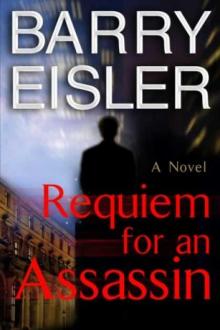 Requiem for an Assassin
Requiem for an Assassin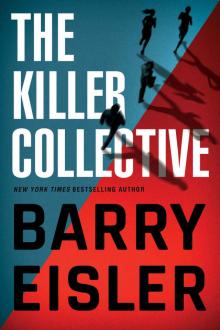 The Killer Collective
The Killer Collective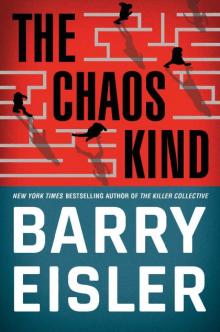 The Chaos Kind
The Chaos Kind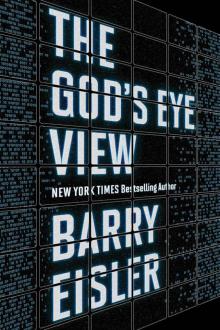 The God's Eye View
The God's Eye View Paris is a Bitch
Paris is a Bitch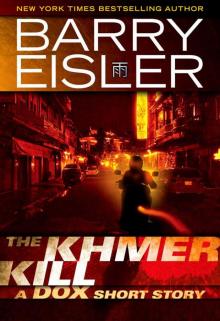 The Khmer Kill: A Dox Short Story (Kindle Single)
The Khmer Kill: A Dox Short Story (Kindle Single)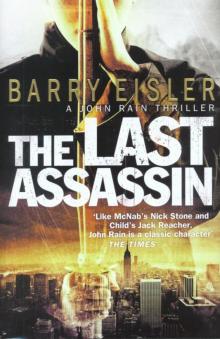 The Last Assassin
The Last Assassin The Detachment
The Detachment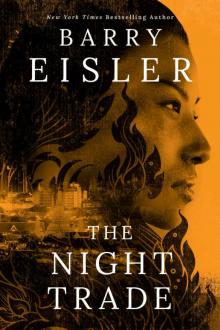 The Night Trade (A Livia Lone Novel Book 2)
The Night Trade (A Livia Lone Novel Book 2)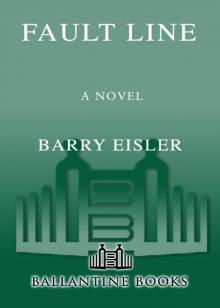 Fault Line
Fault Line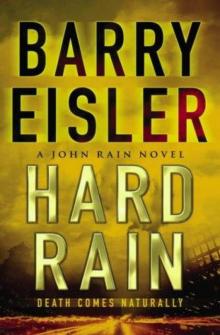 Hard Rain
Hard Rain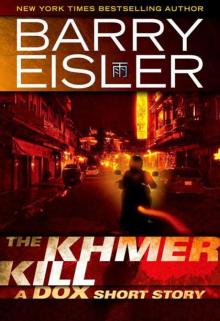 The Khmer Kill_A Dox Short Story
The Khmer Kill_A Dox Short Story London Twist: A Delilah Novella
London Twist: A Delilah Novella The Lost Coast
The Lost Coast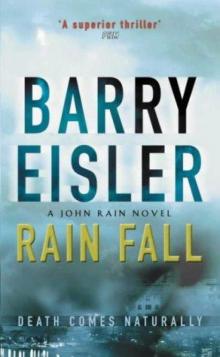 Rain Fall
Rain Fall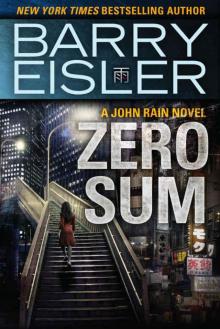 Zero Sum
Zero Sum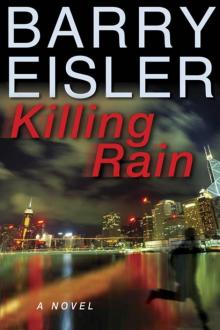 Killing Rain
Killing Rain John Rain 08: Graveyard of Memories
John Rain 08: Graveyard of Memories A Clean Kill in Tokyo (previously published as Rain Fall)
A Clean Kill in Tokyo (previously published as Rain Fall) Inside Out: A novel
Inside Out: A novel John Rain 07 - The Detachment
John Rain 07 - The Detachment Graveyard of Memories
Graveyard of Memories The Lost Coast -- A Larison Short Story
The Lost Coast -- A Larison Short Story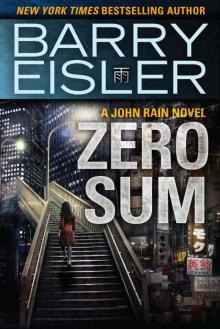 Zero Sum (A John Rain Novel)
Zero Sum (A John Rain Novel)